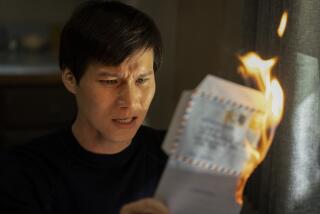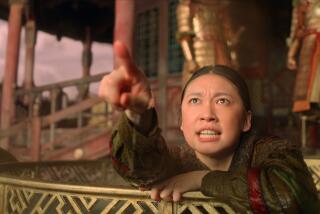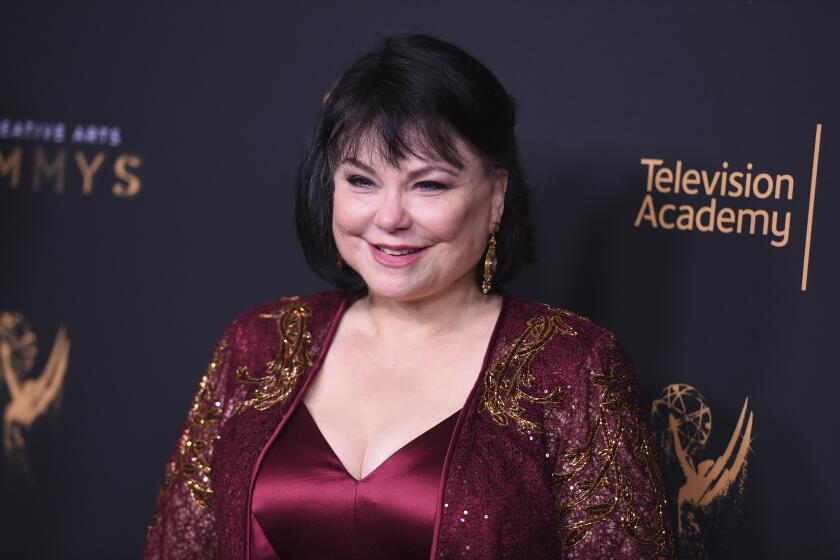With new series ‘Hunters,’ Syfy dives into geopolitical waters (yes, that Syfy)
In recent years, the cable network Syfy has furnished television with a slew of fantastical threats.
Chupacabra have attacked the Alamo. A zombie virus has imperiled this alternative United States. And of course, sharks have flown through the streets of Los Angeles, posing nearly as much of a danger to inhabitants as Ian Ziering does.
But beginning Monday night, when Syfy debuts the new series “Hunters,” viewers will bear witness to a more Earthly set of concerns: terrorism and the fear of the other.
As geopolitics have seized the imagination of high-end programmers -- Showtime has “Homeland,” FX has “The Americans” and HBO had “The Brink,” briefly -- “Hunters” offers what amount to a genre retort. Can a place primed for pulp, it asks, also probe post-9/11 problems?
“The world doesn’t need another alien show just for the sake of an alien show,” said Bill McGoldrick, executive vice president of scripted content for NBC Universal’s cable networks, including Syfy. “We want this to really be about something.”
“Hunters” centers on a group of eponymous beings that has adopted human form and insidiously taken up residence among the real kind.
As the first episode (of 13) unfolds, the hunters’ presence is discovered by Flynn Carroll (Nathan Phillips), an FBI agent and PTSD-afflicted U.S. veteran. The disappearance of Flynn’s wife leads him to a group called the Exo Terrorism Unit, or ETU, a top-secret U.S. government agency dedicated to rooting out the hunter threat.
Some traditional alien-show touches abide. As hunter bodies are torn open, blood, gore and guts abound; dinner-time viewing, this is not.
Yet even amid the genre brain splatter, the news remains top of mind.
Creatures communicate using specialized sonar signals -- specifically via messages embedded in music -- in a touch that calls to mind jihadi groups’ Internet chatter.
The season’s fourth episode, in which a hunter is captured and held for questioning, has agents expressing competing views about enhanced interrogation; it could come straight out of the congressional debate over torture.
And if the overtones needed more emphasis, “Hunters” features numerous references to real-world terrorism concerns, including threats with the unmistakable ring of a suicide-bomber video.
”For years we have remained hidden amongst you, watching, waiting,” one hunter says in a warning. “We take nothing without reason. What we want is good and right ... our cause is just. The end justifies the means. You will bleed. You will cry. You will die.”
Another reference is similarly explicit -- a hunter leader is described as “the Bin Laden of little green men.”
Based on the Whitley Strieber novel “Alien Hunter” (though departing significantly from it), “Hunters” came to life when the veteran film and television producer Gale Anne Hurd acquired the material several years ago and thought it was ripe for adaptation. She brought it to Natalie Chaidez, an experienced writer and producer (“Heroes,” “Terminator: The Sarah Connor Chronicles”) in her own right.
Chaidez saw in the material some strong contemporary parallels.
“It began as me saying, ‘Why is it that in so much science fiction the aliens don’t just take over?’” said Chaidez, who serves as creator and showrunner. “It’s because they can’t. They’re here, they’re hungry and they’re desperate. They need to think of asymmetrical warfare. And that led me to an allegory of terrorism.”
The resulting Syfy series seeks to tell a story of timely global issues disguised as body-horror thriller. Or is it, perhaps, the inverse -- a Cronenberg homage from someone who’s been watching a lot of CNN?
Either way, the marriage might seem unexpected. But those behind the show say such ideas sprung up naturally.
“Terrorism is one of the central subjects of our time,” Hurd said. “So what we said is let’s do a genre series that can be entertainment on one level but also provoke discussion.”
As a key figure behind upscale sci-fi films such as “Aliens” and “The Terminator” -- and as an executive producer of TV’s “The Walking Dead” -- Hurd is a leading figure of Trojan Horse topicality. “Aliens can be a stand-in for terrorism just the way zombies can be a stand-in for an apocalypse we didn’t see coming,” she said, referring to “Walking Dead.” (Hurd, it should be noted, also produced the initial “Alien Nation” film, which used tensions between extraterrestrials and Earth natives as a parable for immigration.)
Actors say they felt the same frisson on set. “It’s an allegory -- it’s: ‘Is what we believe is good for humanity actually good for humanity?’” said actress Britne Oldford, who plays an ETU agent and one of the show’s more ambiguous characters. “You can hit the mute button on what’s happening in the world but that doesn’t mean it isn’t happening.”
Drawing from such real-world concerns does pose its challenges. The news can move quickly -- so quickly the show can become out of date or even inappropriate.
When early episodes were made available to reporters, one of them included a line of dialogue from an ETU agent that said the hunters “make ISIS look like Girl Scouts.” But after the Brussels attacks several weeks ago, producers thought that could be deemed insensitive to victims. The episode was reedited with a more generic line about the threat that did not reference Islamic State.
Chaidez also said producers wanted to avoid the perception that they were lumping in entire religions or ethnicities with the hunter threat -- the aliens are meant to represent radicals only -- so set about casting as racially eclectic group of hunters as possible on the show’s Australia set.
Over the history of screen storytelling, sci-fi has been a popular vehicle for political and sociological points, from “Planet of the Apes” to “A Clockwork Orange” to “Blade Runner” to, well, “Planet of the Apes” reboots.
Since the current cable landscape began to evolve, though, SyFy has often taken a more escapist tack.
“Battlestar Galactica,” with its echoes of various political systems, was an exception. But that show went off the air seven years ago -- a lifetime in the modern TV era and before premium cable began telling many of its gritty stories. Viewers tuning in to “Homeland” expect attacks that claim innocents and provoke discomfort. Whether a basic-cable audience seeking primetime flights of fancy wants to deal with the prickly -- and often tragic -- reminders of modern terrorism remains to be seen.
Those backing the show, however, say such concerns underestimate the power of modern genre storytelling and its ability to provide a form of sleight-of-hand.
“I actually think we have more latitude than some of the other shows,” McGoldrick said. “We’re protected by the fact that these characters are aliens.”
Twitter: @ZeitchikLAT
ALSO
‘Suicide Squad’ director addresses reshoot rumors
Review: Andrew Dice Clay is flawed, fearful and much more likable in ‘Dice’
Q&A: ‘Outlander’ showrunner Ron Moore discusses ‘unflinching’ rape scene and Season 2 reset
More to Read
The complete guide to home viewing
Get Screen Gab for everything about the TV shows and streaming movies everyone’s talking about.
You may occasionally receive promotional content from the Los Angeles Times.







